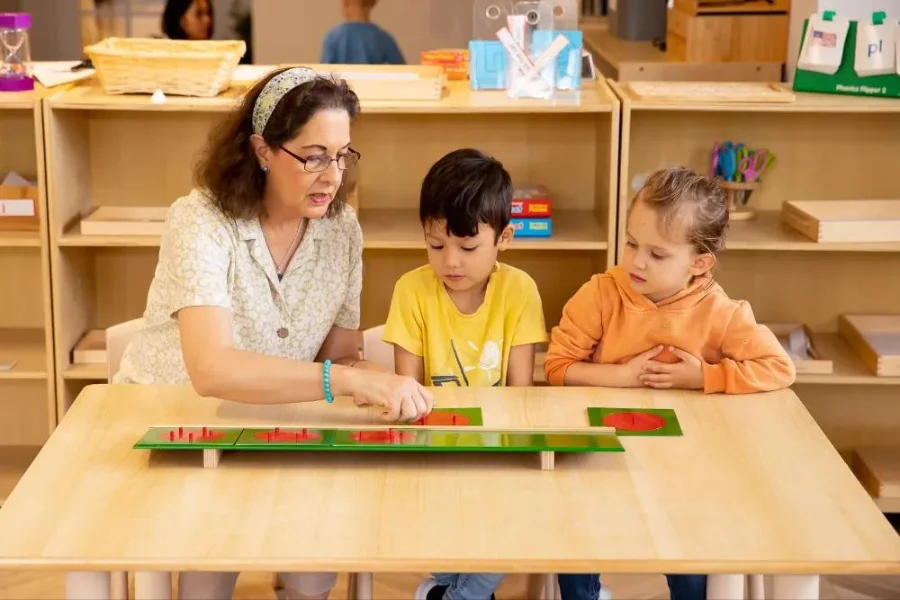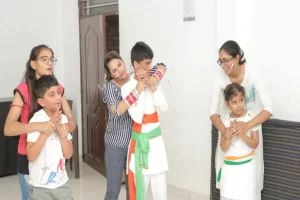
Source: academy
The arena of Early Childhood Education is an exciting and dynamic profession, where the Subjects Early Childhood Education play an essential role in determining the success and well-being of young students. Comprehending the subjects in Early Childhood Education is critical for teachers to nurture an atmosphere that encourages complete improvement in children.
This article delves deeper into the numerous Subjects Early Childhood Education, highlighting their importance and impact in fostering the brains of our further generations. Through this consideration, we focus to deliver visions and understanding that are important for anyone involved in early childhood education and knowledge.
Module I – Child Development & Psychology
This module offers a deep dive into the developmental stages and psychological aspects of early childhood focusing majorly on Child Development & Psychology
Basic Concepts in Child Development
This includes an overview of theories and principles central to understanding how children grow and learn, emphasizing physical, and cognitive, social, and emotional development stages.
Development of Child during Neonatal, Infancy & Toddlerhood
Examining the rapid developmental changes and milestones in the earliest stages of life, from birth to toddlerhood, including motor skills, language acquisition, and emotional bonding.
Development & Characteristics of Pre-schooler
A detailed look at the growth patterns and developmental characteristics of children aged 3 to 5, focusing on their increasing independence, curiosity, and social interactions.
Play
Understanding play’s critical role in learning and development, exploring various types of play and their impact on different areas of development.
Parenting Styles
A study of different parenting approaches and their effects on child behaviour and development, including authoritative, authoritarian, permissive, and uninvolved styles.
Personality & Intelligence
Exploring the formation of personality in early childhood and the development of intelligence, including factors that influence both.
Motivation & Reinforcement
Strategies to effectively motivate young children and use reinforcement to encourage desirable behaviours and learning habits.
Discipline
Approaches to discipline that are developmentally appropriate, respectful, and effective in guiding children’s behaviour.
Our team is ready to assist with your queries on +919869546913 / +919869866277.
Please Click Here if you’d like to download our brochure.

Source: pace
Module II – Organizing Child Care Services
This segment emphases on the organizational and managerial aspects of early childhood education which forms the foundation for gaining knowledge about organizing child care services.
Early Childhood / Pre -School Education
Discussing the structure, philosophy, and methods of early childhood education and its role in laying the foundation for lifelong learning.
Management & Administration of An Early Childhood Centre
Skills and knowledge required for effectively managing an early childhood center, including leadership, administration, and regulatory compliance.
Child Education
Specialized techniques and methods for educating young children, catering to their developmental needs and learning styles.
Curriculum Planning
Developing a dynamic and engaging curriculum that covers all essential learning areas and is adaptable to individual children’s needs.
Readiness
Methods to measure and develop a child’s readiness for school, focusing on emotional, social, physical, and reasoning willingness.
Evaluation
Techniques for evaluating the effectiveness of early childhood programs and tracking children’s progress.
Parent Teacher Co-operation
Building and maintaining positive relationships with parents to support children’s learning and well-being.
Our team is ready to assist with your queries on +919869546913 / +919869866277.
Please Click Here if you’d like to download our brochure.
Module III – Children with Behaviour & Learning Difficulties
The feature of Inclusive Education is being welcomed by all schools which demands to teachers to have adequate knowledge of children with behaviour & learning difficulties.
Directing the requirements of children with special educational requirements:
Children With Behaviour Difficulties
Identifying, understanding, and managing various behavioural issues in children, including strategies for intervention and support.
Speech Problems in Childhood
Recognizing and addressing common speech and language issues in young children, and understanding their impact on learning and social interaction.
Learning Disorders / Difficulties
Understanding different learning disorders and difficulties, and implementing strategies to support and teach children who experience these challenges.
Gifted Children
Identifying and nurturing the unique needs of gifted children, including curriculum modifications and enrichment opportunities.

Source: creighton
Module IV – Child Health & Nutrition
A key feature of early education centering on the physical well-being of children comprising of child health & nutrition
Importance of Food, Nutrition and Health
The fundamental role of nutrition in a child’s physical and cognitive development, and strategies to promote healthy eating habits.
Nutrients & Balanced Diet
Detailed insights into essential nutrients and their role in children’s health, and guidelines for a balanced diet.
Immunization
Understanding the importance of vaccines in preventing childhood illnesses and maintaining public health.
Deficiency Diseases
Identifying and preventing nutritional deficiencies, and understanding their impact on child development.
Common Childhood Illnesses & Diseases
Identifying indications and managing common sicknesses in children, containing protective methods and treatments.
Disorders of the Alimentary & Respiratory System
Insight into common gastrointestinal and respiratory disorders in children, their symptoms, and management strategies.
Care of a Sick Child & First Aid
Essential care practices for sick children and basic first aid techniques, including emergency response protocols.
Role Of School In Providing Health Care
The school’s role in promoting and maintaining children’s health, including health education and environment.
Our team is ready to assist with your queries on +919869546913 / +919869866277.
Please Click Here if you’d like to download our brochure.
Module V – Working with Children
Practical aspects of engaging with and working with children in an innovative manner making learning at school joyous.
Nurturing Creativity
Encouraging and facilitating creative expression in children through various mediums and activities.
Art for Children
Techniques and activities for integrating art into the early childhood curriculum, fostering creativity and fine motor skills.
Story-Telling, Songs & Singing
Utilizing storytelling and music as powerful tools for language development, cultural understanding, and emotional expression.
Planning For Activities
Strategies for designing and implementing effective and engaging activities that cater to various developmental areas.
Activities For Children
A comprehensive range of activity ideas for different age groups and developmental stages, including sensory, motor, cognitive, and social activities.
Class Observation
Techniques for observing classroom dynamics, understanding group behaviours, and assessing teaching effectiveness.
Lesson Plan
Developing lesson plans that are adaptable, engaging, and inclusive, catering to diverse learning needs and styles.

Source: wonderschool
Module VI – School Administration and Management
Discovering the administrative and leadership features of School Administration and management is extremely crucial for the smooth functioning of schools.
- Pedagogical Approaches: A thorough examination of various teaching methods and their applicability in early childhood settings.
- Institutional Goals, Structure and Staff: Aligning institutional goals with educational practices and managing staff to create a cohesive and effective learning environment.
- Teacher: Qualities, Role and Performance Evaluation: Defining the ideal qualities of early childhood educators, understanding their roles, and methods for evaluating performance.
- Recruitment Of Teachers And In-Service Training Programme: Strategies for recruiting qualified teachers and providing ongoing training and professional development.
- Classroom Management Strategies: Effective strategies for managing a classroom, including creating a positive learning environment and handling challenges.
- Evaluation Card: Implementing tools and methods for assessing teacher performance and program effectiveness.
Our team is ready to assist with your queries on +919869546913 / +919869866277.
Please Click Here if you’d like to download our brochure.
Module VII – Programme Planning and Organization
Essential features of program planning and organization in early childhood education:
- Learning Areas In Pre-School: Identifying and developing key learning areas in pre-school settings to ensure a balanced and comprehensive educational experience.
- Bulletin Boards – A Crucial Learning Area: Utilizing bulletin boards as educational tools for displaying information, showcasing student work, and enhancing the learning environment.
- Detailed Planning of School Programs: Methods for planning and organizing school programs, including annual plans, thematic units, and special events.
- Life Skills Education: Incorporating life skills education into the curriculum to prepare children for real-world challenges and responsibilities.
- Parent – Teacher Interaction: Techniques for effective parent-teacher communication and collaboration to support children’s education and well-being.
- ICT And Multimedia: The integration of Information and Communication Technology (ICT) and multimedia resources in early childhood education for enhanced learning experiences.
Module VIII – Curriculum Framework for Pre-School
An in-depth look at the curriculum framework for preschool curriculum development:
- Understanding Developmental Characteristics of Young Children: Structure the syllabus to match the progressive steps and necessities of preschoolers.
- Theme-Based Planning during Early Childhood Years: Implementing theme-based planning to create cohesive and engaging learning experiences that captivate young minds.
- Suggested Teacher-Made “Teaching Learning Material”: Ideas and guidelines for creating effective, age-appropriate teaching materials that enhance learning.
- Warming Up Activities: A range of activities designed to engage children at the beginning of a learning session, setting the tone for effective and enjoyable learning.
Our team is ready to assist with your queries on +919869546913 / +919869866277.
Please Click Here if you’d like to download our brochure.
Module IX – Planning Thematic Curriculum
Specialized focus on planning thematic curriculum enabling enhanced learning for preschoolers:
- My Body: Teaching children about human anatomy, personal hygiene, and health in an age-appropriate and engaging manner.
- Animals: Introducing children to the fascinating world of animals, including habitat, behaviour, and conservation.
- Water: Exploring the properties, uses, and importance of water in our lives and the environment.
The Subjects Early Childhood Education are huge and primary to developing effective, kind, and inventive educators. Through these modules, educators gain crucial information and practical skills to improve and guide the next generation of students, laying a strong foundation for their future educational and personal success.
Early Childhood Education Course
In the field of teacher training, the importance of Early Childhood Education cannot be exaggerated. Boarding on this transformative voyage with the Early Childhood Education Course at Vidhyanidhi Education Society offers countless advantages, ensuring a strong foundation for inspiring educators. This course is structured to improve teaching methodologies, enrich information, and nurture a fostering atmosphere for young beginners.
The Advantage of Pursuing the Early Childhood Education Course at Vidhyanidhi Education Society:
Flexibility and Accessibility
The complete course is offered online, making it available to a broad range of learners. This flexibility provides various lifestyles and commitments, allowing learners to study at their own pace.
Innovative Learning Resources
Each module of the Early Childhood Education Course is accompanied with pre-recorded lectures. These lectures offer a word-to-word explanation of key concepts, ensuring clarity and depth in understanding.
Stress-Free Evaluation
The course adopts an assignment-based evaluation system. This approach focuses on understanding and application rather than rote learning, fostering a deeper engagement with the Subjects Early Childhood Education.
Personalized Support
A designated course coordinator is assigned to each student. This personalized guidance ensures that learners receive thorough support throughout their educational journey.
Certification with non-mention of the word Online
The certification awarded upon completion of the course does not mention the mode of study. This aspect enhances the value of the certification, making it universally acceptable and advantageous for career prospects.
The Subjects Early Childhood Education covered in this course are meticulously chosen to address all facets of early learning. They comprise of developmental psychology, pedagogical strategies, and the foundation of inclusive and engaging educational atmosphere. The focus on these concepts ensures that educators are adequately trained to provide the various requirement of young learners.
The Early Childhood Education Course at Vidhyanidhi Education Society is more than just an educational pursuit. It is a voyage towards becoming a skilled instructor who can shape the minds and futures of young learners. With its modified learning methods and inclusive syllabus, this course stands as a beacon for those aiming to shine in the field of Early Childhood Education.
Join VES for a stellar Early Childhood Education journey. Transform futures now!
Our team is ready to assist with your queries on +919869546913 / +919869866277.
Please Click Here if you’d like to download our brochure.
Subjects Early Childhood Education
FAQs
Which institute is best for Early Childhood Education Course?
For top-tier Early Childhood Education, Vidhyanidhi Education Society stands out with its comprehensive, student-focused approach.
Why choose Early Childhood as a Career?
Choosing Early Childhood as a career offers fulfilling, impactful work shaping young minds, fostering growth, and sparking lifelong learning.
What is the average salary for a Early Childhood Teacher?
In India, an Early Childhood Teacher's average salary is around ₹3,00,000 to ₹5,00,000 per annum, varying with experience and location.



